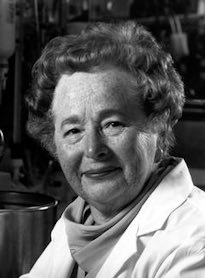One of the nation’s most distinguished research scientists, Gertrude Elion’s Nobel Prize in 1988 capped a career devoted to research to combat some of the world’s most dangerous diseases.
Elion, working predominantly with George Hitchings, created drugs to combat leukemia, gout, malaria, herpes and autoimmune disorders. She and Hitchings devised a system for designing drugs that led to the development of the AIDS drug AZT.
In the 1950s she pioneered the development of two drugs that interfered with the reproductive process of cancer cells to cause remissions in childhood leukemia. In 1957 she created the first immuno-suppressive agent, leading to successful organ transplants. In 1977, her work led to the development of the first drug used against viral herpes.
Gertrude Elion, who lost her grandfather and mother to cancer, never lost sight of the human beings whose lives her research affects. She said, “When you meet someone who has lived for 25 years with a kidney graft, there’s your reward.”

